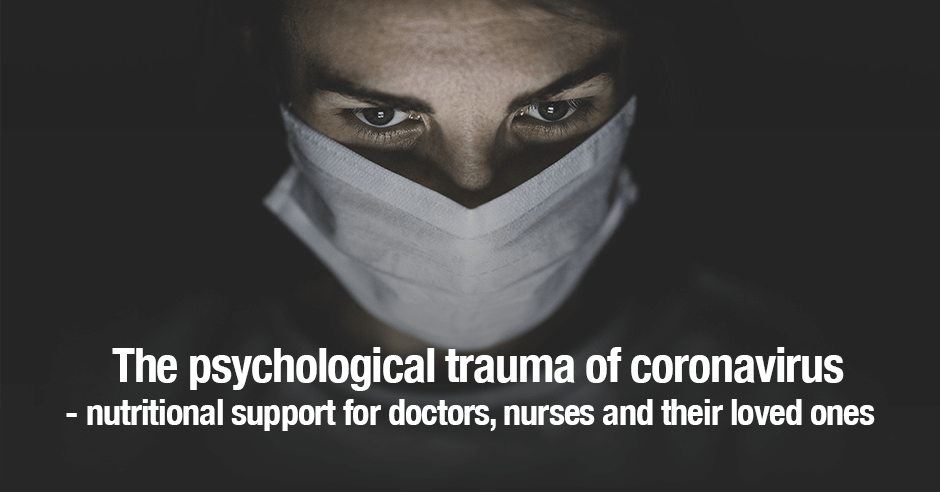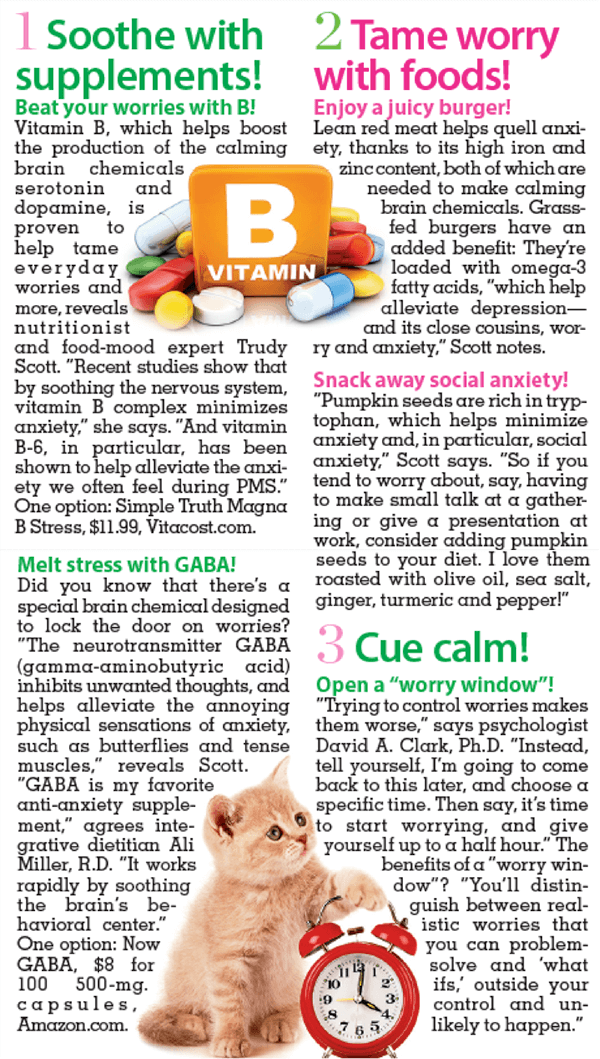
If you are a nurse or doctor or providing support in any capacity in hospitals and other essential services during this coronavirus pandemic you need nutritional support. You may be feeling on edge and anxious, worried about the future, concerned and angry about the lack of personal protective equipment (PPE), fearful for your safety and terrified about bringing the virus back to your family, exhausted and yet not able to sleep, feeling overly emotional and weepy about your patients (and decisions you are making or you anticipate having to make), and starting to have nightmares.
I’m not downplaying the enormity of the stress and trauma you are already facing and will continue to face, but we must not forget that nutrients (and nature and exercise) have a role to play in PTSD and trauma. They help to make you more resilient and mitigate some of the effects of trauma, and they also support healing and recovery.
When you feel calmer and you sleep better, you indirectly support your immune function too. There is also research that directly supports the role that GABA plays in improving immune function (more on this below).
B-complex and a multi-vitamin for everyone
If this is all that can be managed, a B-complex and a good multi-vitamin would be my first choice for everyone. I wrote this blog during Hurricane Harvey: Nutrition solutions for psychological stress after a natural disaster. It’s equally applicable now. Simply replace “after a natural disaster” with “during the coronavirus pandemic.”
My colleagues Bonnie Kaplin and Julia Rucklidge published this paper in 2015: A randomised trial of nutrient supplements to minimise psychological stress after a natural disaster. They found that folks traumatised after New Zealand earthquakes and floods in southern Alberta, Canada, showed significantly greater improvement in stress and anxiety when consuming a B-Complex and/or broad-spectrum mineral/vitamin formula.
In a newly published article in the Calgary Herald, Dr. Kaplan explains how these nutrients act as co-factors for making serotonin, GABA and dopamine and that “we should all consider a B-complex and/or a broad-spectrum nutrient formula on a daily basis to strengthen our mental resilience.”
My second recommendation is GABA and/or theanine
Supporting low levels of GABA, the calming neurotransmitter, eases your anxiety, improves your sleep and supports your immunity. When you feel calmer and you sleep better, you indirectly support your immune function too:
the physiological response to psychological stressors can dramatically impact the functioning of the immune system (from this paper)
We also have research that directly supports the role that GABA plays when it comes to improving immune function.
We want you to stay emotionally and physically strong and so does your family!
I write more about this here: GABA and theanine for easing anxiety, improving sleep and supporting immunity. I share advice if you’re currently using GABA/theanine or have used it in the past, and a summary if you’re new to low GABA anxiety symptoms and using GABA/theanine.
Melatonin and serotonin support
I have my clients use a sublingual melatonin for going to sleep and a timed-release melatonin for staying asleep, and it’s another recommendation I’m making.
Melatonin improves sleep, helps ease anxiety and fear and may help with PTSD:
- A double-blind, placebo-controlled crossover trial concludes that “melatonin may be an effective treatment for shift work nurses with difficulty falling asleep.”
- Low levels of melatonin are common in military-related PTSD.
- Melatonin modulates fear and “may serve as an agent for the treatment of PTSD”.
This in press and pre-proof paper reports on melatonin: COVID-19: Melatonin as a potential adjuvant treatment:
Melatonin, a well-known anti-inflammatory and anti-oxidative molecule, is protective against ALI/ARDS [acute lung injury/acute respiratory distress syndrome] caused by viral and other pathogens. Melatonin is effective in critical care patients by reducing vessel permeability, anxiety, sedation use, and improving sleeping quality, which might also be beneficial for better clinical outcomes for COVID-19 patients. Notably, melatonin has a high safety profile.
This is very promising for offering added protection if you are working on the front-line and for your patients too.
Serotonin is the precursor to melatonin and the amino acid tryptophan is one of the raw materials for making serotonin. I would also include tryptophan or 5-HTP for supporting serotonin levels to help with the worry and anxiety in the head, lying awake ruminating, feelings of fear, anger, depression, worry and negative thinking.
Try to get into nature for the pure joy of it and to lower your cortisol
Do your absolute best to try and get some nature. I share some simple options in this blog:
- Get out into nature at least one day a week i.e. do some “forest bathing”
- Take a short detour and drive to work via a tree-lined street
- Look at some images of nature: sit and stare at a giant poster or even watch a show on National Geographic
Beyond the pure joy of spending time in nature, there is research supporting all of the above in playing a role in reducing anxiety, feeling more positive and calm, reducing cortisol levels and helping with recovery from stressful situations.

Do this workout a few times a week for mood support
Here is a great workout from Dr. Zach Bush, MD. He recommends doing it 3 x day and starting with 10 reps of each of the 4 exercises and building up to 20 reps of each one:
The Four Minute Workout is a new concept of exercise that revolves around the body’s ability to use Nitric Oxide for muscle growth. This is an efficient anaerobic workout that can be done multiple times per day. The more frequently you do it, the better your results.
In this blog, I write how signals from our large leg muscles alter our brain and nervous system and improve mood.
If it’s your loved-one on the front-lines be sure to take care of yourself too
All of this nutritional support is also important if you are the mother or husband or wife or sister or brother etc. who is anxious and worrying about your loved one. You need to be strong for them so be sure to take care of you too.
Even if you are not working on the front-line or don’t know anyone doing so, if you are experiencing any of the above emotions, you need nutritional support too.
The New York Times article
It was reading this very somber and eye-opening article in the New York Times that promoted me to write this blog: The Psychological Trauma That Awaits Our Doctors and Nurses
The angst that clinicians may experience when asked to withdraw ventilators for reasons not related to the welfare of their patients should not be underestimated,” warn the authors of the article in The New England Journal of Medicine.“It may lead to debilitating and disabling distress.
We look at veterans and thank them for their service, never being able to fully comprehend what they’ve been through. The same may soon be true of some of our health care professionals. We may think we know. But we don’t.
No-one should have to make these choices and our hearts break for you and the families who are being impacted.
Louisiana article conveys the gravity of the situation like no other
Unfortunately it is happening already. This article conveys the gravity of the situation like no other and I’ve been pouring through everything – an account from a respiratory therapist in a Louisiana hospital (published two weeks ago.) We have been hearing similar stories from Italy for over a month now. Be warned – it’s horrifying!
It does include this statement… “The medical details in this story were vetted by an infectious disease doctor, a cardiologist and an internist at three different hospitals. All of the information about ARDS, the condition that the respiratory therapist describes, was fact-checked against peer-reviewed articles and UpToDate, a resource for physicians to check current standards in care, clinical features, and expected complications and outcomes.”
Because but I’m not familiar with this publication, I also checked with colleagues who are doctors and this is medically accurate.
While we don’t want to create panic I want to understand what doctors and nurses are facing so I can help. I do also believe we all deserve to know the facts, so we can truly support our doctors and nurses, and so we take this very seriously and stay home!
My biggest wish
It is my biggest wish that we can prevent much of this heart-ache and trauma going forwards, by preventing the spread of this virus and preventing the need for ventilators by helping sick individuals recover more quickly or prevent folks getting sick in the first place.
I do know of many incredible functional medicine practitioners who are creating task forces and working behind the scenes putting together proposals to present to governors, governments and mainstream medicine.
The products I mention and eating real whole food
The products I recommend to my clients are Designs for Health B Supreme and Designs for Health Twice Daily Multi.
You can find the GABA, theanine, tryptophan and 5-HTP on the supplements blog here.
If you are working in a hospital or medical setting or essential services
- Please reach out if you need help with any of this – how to implement these recommendation or where to get the products
- If you’re already doing this please share so we can encourage others to support themselves
And if your loved ones or friends in healthcare need support
- Please share this blog with them and help them get access to these nutrients
- I also encourage you to read my book – The Antianxiety Food Solution – How the Foods You Eat Can Help You Calm Your Anxious Mind, Improve Your Mood, and End Cravings – and give them the highlights about eating real whole food, quality animal protein, organic veggies and fruits, fermented foods, healthy fats, avoiding caffeine and sugar, eating for blood sugar control etc.
- Please share if you know ways we can get this information (and nutrients) into the hands of more of our front-line workers
- My focus is nutrition and nutrients but they also need someone to talk to so give them a call and be a listening ear. Also, help them find an online therapy service if they feel they need it. It’s encouraging to see more and more of this being made available.
One final comment – these are the bare essentials. In an ideal world, with more time, it would be best to work with a functional medicine practitioner and nutritionist and figure out your exact nutritional needs.

